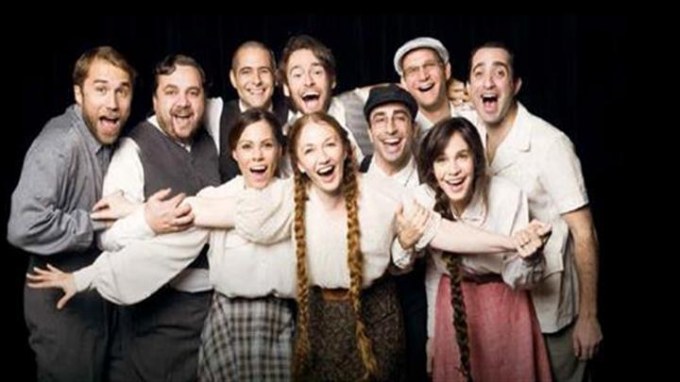Our Class, a joint Cameri Theatre – Habima National Theatre production of Tadeusz Słobodzianek’s play directed by Hanan Snir is many things, but it is first and foremost a work of art.

Drawing on the events of history and their documentation, it seeks through theatre to touch on those tender hidden places and ambiguities that cannot be understood or experienced in the same way from statistical data, interviews with witnesses or the analysis of experts. The relationship between Jews and Poles is complex and as replete with intimate connection as it is with conflict. Słobodzianek’s play looks at a group of 10 classmates, Catholics and Jews, living a small town in Poland, and follows their lives in 14 scenes, or “lessons,” from the years leading up to WWII, the war years, and the interwoven path of history, chance, and individual choice in the years that follow.
The title “Our Class” confers a sense of community on a group of people, who even in childhood are separated by prejudice, rivalries and temperament. It is more of a reflection on the desire for community and connection, and the sense of nostalgia that tends to influence one’s reflection on the past, the desire to believe that there was a time of innocence. Opening with a scene of schoolyard games, folk games that strike a chord of recognition across cultures, the viewer is easily caught up in the energy of childhood, a blank slate whose future has not yet been inscribed. The games and songs evoke an idealized image of childhood and youth, often far removed from the harsh reality. The memory of those first enchanted moments will stand in stark contrast to all that will follow.
As they participate in the age old ritual of roll call, reciting their names and their dreams for the future – I want to be a farmer, I want to be a seamstress – with shy smiles, one is reminded that we already know what the future holds for these eager students.
The words “our class” and “my friend” recur over the course of the play as the years go by, acquiring layers of bittersweet irony as politics, religion and geography leave their mark upon that slate. These elements of structure – song, dance, and recurring phrases, create a distance from the events, offering the viewer a perspective from which to reflect on the narrative. The litany of names repeats twice more, in different situations, within the play. There is a sense of the repetitive nature of human character, and therefore, human history. There are no villains, there are no heroes; there is a circle dance of circumstance and choice.
There is an excellent ensemble performance in Our Class, with each actor immersed in the role, each contributing a different hue and timbre, like the variety of personalities, talents, and opinions brought together by fate in one class. The staging, music, choreography and costumes are all precise and work together to evoke an experience that is visually appealing, emotionally moving, and thought provoking.
Our Class is based on a historical event: the massacre of Jews in Jedwabne, Poland on July 10, 1941. The playwright’s sources for research included the book Neighbors: The Destruction of the Jewish Community in Jedwabne, Poland, by Jan Tomasz Gross (Polish edition, 2000; English edition, 2001), My z Jedwabnego (We of Jedwabne, 2004) by Anna Bikont, and the documentary film Sąsiedzi (Neighbors, 2001) directed by Agnieszka Arnold.
Our Class by Tadeusz Słobodzianek; directed by Hanan Snir; translated by Anat Zajdman; Dramaturg: Varda Fish; Music: Shosh Riseman; Set: Roni Toren; Costumes: Polina Adamov; Lighting: Meir Alon; Choreography: Miri Lazar; Lyrics translated by Daniel Efrat; Cast in order of appearance: Alon Dahan, Roi Miller, Evgenia Dodina, David Bilenca, Rotem Keinan, Eran Mor, Dan Shapira, Miki Peleg-Rotshtein, Netta Garti, Alex Krul; Live music: Accordions – Dan Shapira, Alex Krul, Clarinet – David Bilenca, Harmonica – Miki Peleg-Rotshtein, Saw – Eran Mor.
For future performance dates, consult the Cameri Theatre website.





